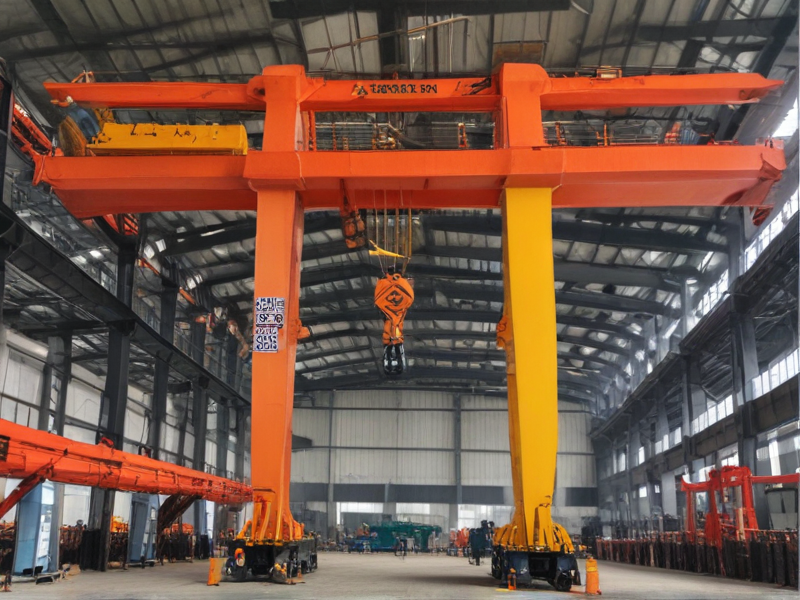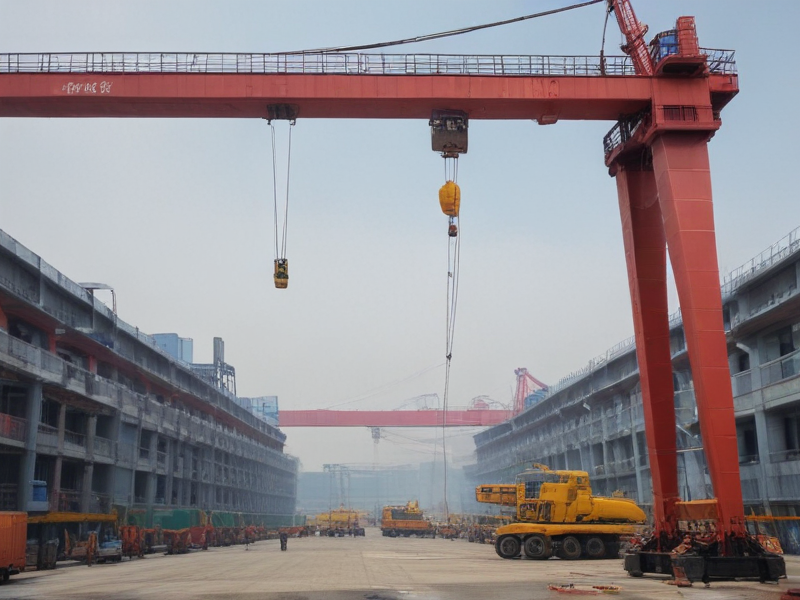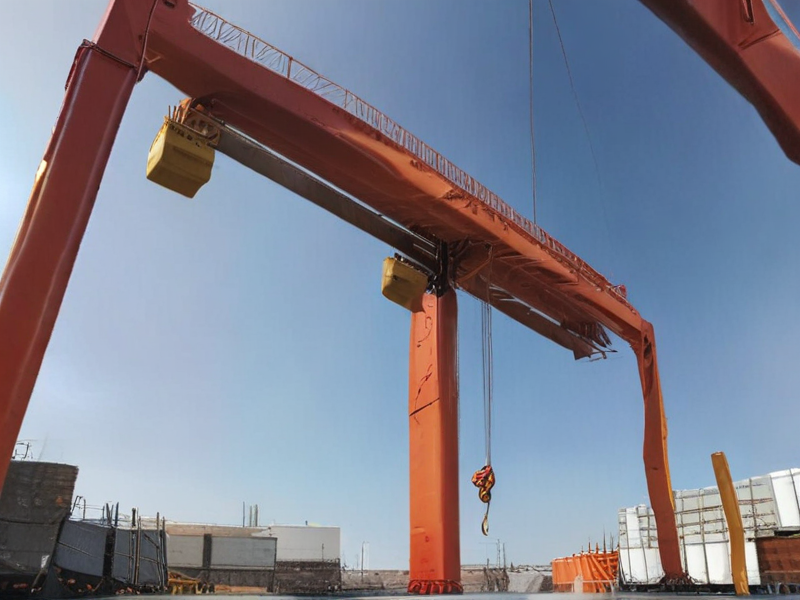Top 10 hoisting crane company in China introduce,list main products and website if have
1. ZPMC (Shanghai Zhenhua Heavy Industries Co., Ltd.)
– Main Products: Port cranes, ship-to-shore cranes, and large steel structures.
– Website: [www.zpmc.com](http://www.zpmc.com/)
2. Sany Group
– Main Products: Mobile cranes, tower cranes, and all-terrain cranes.
– Website: [www.sanyglobal.com](http://www.sanyglobal.com/)
3. XCMG (Xuzhou Construction Machinery Group Co., Ltd.)
– Main Products: Truck cranes, all-terrain cranes, and crawler cranes.
– Website: [www.xcmg.com](http://www.xcmg.com/)
4. Zoomlion Heavy Industry Science & Technology Co., Ltd.
– Main Products: Tower cranes, mobile cranes, and crawler cranes.
– Website: [en.zoomlion.com](http://en.zoomlion.com/)
5. Liebherr (Liebherr Machinery Service (Shanghai) Co., Ltd.)
– Main Products: Heavy-duty cranes, mobile cranes, and tower cranes.
– Website: [www.liebherr.com](http://www.liebherr.com/)
6. Guangxi Liugong Machinery Co., Ltd.
– Main Products: Rough terrain cranes, all-terrain cranes, and truck cranes.
– Website: [www.liugong.com](http://www.liugong.com/)
7. Shandong Runchen Heavy Industry Co., Ltd.
– Main Products: Overhead cranes, gantry cranes, and jib cranes.
– Website: [www.runchencrane.com](http://www.runchencrane.com/)
8. Hebei Lihui Hoisting Machinery Manufacturing Co., Ltd.
– Main Products: Electric hoists, manual chain hoists, and crane kits.
– Website: [www.lhhoist.com](http://www.lhhoist.com/)
9. Henan Weihua Heavy Machinery Co., Ltd.
– Main Products: Overhead cranes, gantry cranes, and mining cranes.
– Website: [www.weihuacraneglobal.com](http://www.weihuacraneglobal.com/)
10. Dalian Huameilong Metal Products Co., Ltd.

How to find and select check reliable hoisting crane company in China
To find and select a reliable hoisting crane company in China, follow these steps:
1. Research Reputable Sources: Begin by searching on reputable industry websites, trade associations, and online marketplaces like Alibaba, Made-in-China, and Global Sources.
2. Check Certifications: Ensure the company has necessary ISO certifications and complies with local and international standards. Look for certificates like ISO 9001 for quality management and CE for European safety standards.
3. Read Reviews and Ratings: Check customer reviews and ratings on third-party sites to gauge the experiences of other clients. Trustpilot, Google Reviews, and industry-specific forums are good starting points.
4. Evaluate Experience and Expertise: Choose companies with a proven track record and extensive experience in hoisting cranes. Longevity in business often indicates reliability and expertise.
5. Visit Official Website: Review the company’s official website for detailed information on their products, services, and client testimonials. A professional, detailed, and updated website is a good sign of legitimacy.
6. Inspect Quality Control Processes: Inquire about their quality control measures. Reliable companies should have rigorous inspection and testing protocols to ensure product safety and reliability.
7. Request References: Ask for references from previous international clients. Contact these references to confirm their satisfaction and reliability of the supplier.
8. Assess After-Sales Support: Check if the company offers robust after-sales support, including installation, maintenance, and training services. Reliable customer service is crucial for long-term business relationships.
9. Price Comparison: While affordability is important, do not compromise on quality. Compare prices with other companies to ensure you get the best value for your money without sacrificing quality.
10. Conduct a Site Visit: If possible, visit the manufacturing facility to inspect their production capabilities and quality assurance processes firsthand.
By following these steps, you can shortlist and select a reliable hoisting crane company in China.
Background Research for hoisting crane company in China, use qcc.com archive.org importyeti.com
To conduct a comprehensive background research for a hoisting crane company in China, we can utilize three important resources: qcc.com, archive.org, and importyeti.com. Here is a brief overview of the steps and findings from each platform:
1. qcc.com:
This is a Chinese corporate database that provides detailed information about companies registered in China. You can search for a specific hoisting crane company using its Chinese name or registration number. The results typically include the company’s business scope, registration details, financial data, legal representatives, shareholding structure, and key personnel. This information will enable you to assess the company’s financial health, market position, and operational history.
2. archive.org:
Known as the Wayback Machine, archive.org allows you to view historical versions of company websites. This can be particularly useful to track the evolution of the company’s branding, product offerings, and customer communications. By examining historical snapshots, you can identify the company’s growth trajectory, marketing strategies, and any notable changes over time.
3. importyeti.com:
ImportYeti is a tool that provides insights into a company’s international trade activities, particularly its import records. By searching for the hoisting crane company, you can uncover details about its supply chain, including major suppliers, shipment volumes, and products imported. This data helps in understanding the company’s global reach, procurement practices, and potential market demand.
Example Company: XCMG (Xuzhou Construction Machinery Group Co., Ltd.)
– qcc.com: Reveals XCMG’s comprehensive profile, highlighting its extensive business in manufacturing hoisting cranes, its financial standing, and significant shareholders.
– archive.org: Shows the evolution of XCMG’s online presence, tracing back to past website snapshots which document product line expansions and notable company milestones.
– importyeti.com: Details XCMG’s import records, showing interactions with international suppliers, especially for parts and technology, underpinning its manufacturing priorities.
By leveraging these resources, you gain a well-rounded understanding of a hoisting crane company’s operational, financial, and market dimensions.

Price Cost Research for hoisting crane company in China, use temu.com and 1688.com
Conducting price cost research for a hoisting crane company in China using popular e-commerce platforms like Temu.com and 1688.com can help identify competitive pricing and market expectations. Here’s a brief overview:
Temu.com
Temu.com is an emerging e-commerce platform catering to various products, although it may not have the extensive range of industrial equipment found on 1688.com. Searching for hoisting cranes (起重机) on Temu.com will provide baseline prices for both small-scale and larger machinery.
– Light-Duty Hoisting Cranes: Prices range from $200 to $1,000, typically for smaller, portable units suitable for light industrial use.
– Medium to Heavy-Duty Hoisting Cranes: These cranes, used more commonly in larger warehouses or for construction, range from $1,500 to $10,000.
1688.com
1688.com is a comprehensive B2B platform owned by Alibaba, known for bulk-buying and extensive industrial product listings, making it ideal for detailed, scaled price research.
– Small Portable Hoists: Prices start at approximately ¥1,500 to ¥5,000 ($230 to $770), suitable for light industrial or occasional use.
– Medium-Duty Hoisting Cranes: Typical prices range from ¥10,000 to ¥50,000 ($1,540 to $7,700), encompassing trolley-type models and various operational capacities.
– Heavy-Duty Hoisting Cranes: These could range from ¥100,000 to ¥500,000+ ($15,400 to $77,000+), including large gantry cranes or those for major construction projects.
Comparative Insights
1. Pricing Consistency: Prices for hoisting cranes on 1688.com tend to be more varied, reflecting greater options and customizability.
2. Quality and Specifications: Higher prices usually correlate with increased lifting capacity, enhanced safety features, and added functionalities like remote control.
For optimal results, make direct comparisons, considering shipping costs, warranty services, and after-sales support. Inquire specifically about customization options that could influence pricing and ensure regulatory compliance for international buyers.
Compare China and Other hoisting crane company: Products Quality and Price,Visible and Hidden Costs
China-based hoisting crane companies, such as Zoomlion, Sany, and XCMG, are known for offering competitive prices due to lower labor and production costs. While their products have improved significantly in quality, they often still lag behind top-tier Western brands like Liebherr, Manitowoc, and Terex in terms of durability, precision, and advanced features.
Products Quality and Price: Chinese cranes generally provide a good price-to-performance ratio, making them attractive for budget-conscious buyers. Western cranes, although more expensive, typically offer superior longevity, reliability, and cutting-edge technology. For instance, a Chinese tower crane may cost significantly less upfront compared to a Liebherr alternative, but the latter often provides better operational efficiency and uptime.
Visible and Hidden Costs:
– Visible Costs: These include the purchase price, shipping, and installation. Chinese cranes are usually cheaper in this regard.
– Hidden Costs: Maintenance, spare parts, and downtime due to potential breakdowns represent hidden costs. Chinese cranes might incur higher hidden costs over time, as their components may wear out faster and replacement parts could be harder to source. Western cranes usually have comprehensive service networks and warranties, contributing to lower operational disruption and better overall value in the long run.
In summary, while Chinese hoisting cranes offer attractive upfront savings, potential buyers should assess long-term performance, service support, and hidden costs. Western cranes may entail higher initial expenses but often deliver better lifetime value, reduced operational risks, and superior performance.
Custom Private Labeling and Branding Opportunities with Chinese hoisting crane company
Partnering with a Chinese hoisting crane manufacturer for custom private labeling and branding can significantly benefit your business. Chinese manufacturers are renowned for their expertise, innovation, and cost-efficiency. Here are the key opportunities:
1. Customization: Chinese crane manufacturers offer a high degree of customization. You can tailor the specifications, design, and features to meet your market’s unique demands and stand out from competitors.
2. Cost Efficiency: Manufacturing in China typically reduces production costs due to lower labor and material expenses. This allows you to maintain competitive pricing or enjoy higher profit margins.
3. Quality and Innovation: Many Chinese manufacturers are ISO certified and invest heavily in R&D technologies, ensuring you receive high-quality, reliable cranes equipped with the latest innovations.
4. Scalability: The vast manufacturing capacity available in China enables quick scaling of production to meet increasing market demands, ensuring you can grow without supply constraints.
5. Branding Freedom: With private labeling, you can create a unique brand identity. Customized logos, color schemes, and packaging can be aligned with your branding strategy, enhancing brand recognition and customer loyalty.
6. Faster Time-to-Market: Efficient production processes and strong logistics networks in China ensure faster turnaround times, enabling quicker market introduction and response to market trends.
7. Comprehensive Support: Chinese manufacturers often provide robust after-sales support, including training, maintenance, and spare parts, ensuring smooth operation and long-term satisfaction for your customers.
By leveraging these opportunities, your business can deliver differentiated, high-quality hoisting cranes under your brand, boosting market share and enhancing your brand’s reputation. Partnering with the right Chinese manufacturer can be a strategic move to achieve sustained growth and competitive advantage.
Tips for Procurement and Considerations when Purchasing from hoisting crane company
When procuring from a hoisting crane company, thorough consideration is essential to ensure your investment is sound and effective. Here are some tips and factors to keep in mind:
1. Evaluate Requirements: Identify your specific lifting needs, including load capacity, height, reach, and operating environment. This will help you select the right type of crane (e.g., tower, overhead, mobile).
2. Reputation and Experience: Research the company’s history, client reviews, and case studies. A well-regarded company with a track record of reliable performance and safety standards is preferable.
3. Compliance and Standards: Ensure the cranes meet local and international standards (ISO, ANSI, OSHA) for safety and quality. This minimizes the risk of regulatory issues and accidents.
4. Customization Options: Determine if the company offers customization to tailor the crane to your operational requirements, enhancing efficiency and versatility.
5. Technological Features: Modern cranes often come with advanced technologies like remote control, automation, and diagnostics. These features can enhance efficiency and safety.
6. After-Sales Support: Adequate training, maintenance services, and quick access to spare parts are crucial. A company offering strong after-sales support can help minimize downtime and extend the equipment’s lifespan.
7. Warranty and Insurance: Confirm the warranty terms and ensure they cover essential components and services. Additionally, verify that the company provides appropriate insurance to cover potential liabilities.
8. Cost Analysis: While the initial price is important, consider the total cost of ownership, including maintenance, operation, and potential downtime costs, to make an informed financial decision.
9. Delivery and Installation: Assess the company’s ability to deliver and install the crane within your required timeframe and ensure they offer proper installation services.
10. Sustainability and Energy Efficiency: Opt for companies that focus on environmental sustainability and energy-efficient operations, which can reduce long-term operational costs and environmental impact.
Selecting the right hoisting crane involves balancing technical requirements, budget, and reliable supplier relationships. Careful evaluation and planning will lead to a successful procurement process.

FAQs on Sourcing and Manufacturing from hoisting crane company in China
FAQs on Sourcing and Manufacturing from a Hoisting Crane Company in China
1. Why should I source hoisting cranes from China?
China is known for its advanced manufacturing capabilities, competitive pricing, and vast selection of hoisting crane models. Sourcing from China often means access to state-of-the-art technology, high production capacity, and cost-effective solutions.
2. How do I ensure the quality of hoisting cranes from Chinese manufacturers?
Ensure quality by choosing reputable manufacturers with certifications like ISO, CE, and SGS. Conduct factory audits, request third-party inspections, and review previous customer feedback and case studies.
3. What types of hoisting cranes are available from Chinese manufacturers?
Chinese manufacturers offer a wide range of hoisting cranes, including overhead cranes, gantry cranes, jib cranes, and electric hoists. Customization options are also available to meet specific operational needs.
4. What is the typical lead time for manufacturing and delivery?
Lead times vary based on the complexity of the order and manufacturer’s production schedule. Generally, it ranges from 30 to 90 days. Confirm the timeline with your supplier during the negotiation phase.
5. How can I manage customs and import duties?
Work with experienced logistics providers and customs brokers. Understanding HS codes and complying with import regulations of your country will streamline the process. Some manufacturers also offer DDP (Delivered Duty Paid) shipping.
6. Are there any warranty and after-sales support?
Reputable Chinese manufacturers usually offer warranties ranging from 12 to 24 months. Ensure clarity on after-sales support, including availability of spare parts and technical assistance.
7. What payment methods are commonly accepted?
Common payment methods include T/T (Telegraphic Transfer), L/C (Letter of Credit), and in some cases, escrow services. Initial deposits range from 30% to 50%, with the balance paid upon shipment or after inspection.
8. How can I mitigate risks in sourcing?
Mitigate risks by diversifying suppliers, engaging in contractual agreements, and employing third-party quality control services. Building long-term relationships with reliable manufacturers also reduces sourcing risks.
9. Can I visit the manufacturing facility?
Yes, most manufacturers welcome factory visits. It’s advisable to visit the facility to understand production processes, quality control measures, and engage directly with the team.
10. What are the communication channels used?
Communication is usually conducted through emails, phone calls, and video conferences. Many manufacturers also use instant messaging apps like WeChat and WhatsApp for real-time updates.

